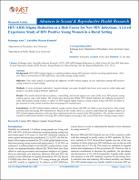HIV/AIDS Stigma Reduction as a Risk Factor for New HIV Infections: A Lived Experience Study of HIV Positive Young Women in a Rural Setting
Abstract
Background: HIV/AIDS-related stigma is a global problem among HIV patients with far-reaching implications. However,
there is an increase in HIV infections, especially among young women.
Objective: This study aimed at exploring the influence of HIV-related stigma on new infections among HIV-positive
young women in a rural setting.
Methods: A cross-sectional exploratory research design was used. In-depth interviews were used to collect data and
analysis was done using a thematic approach.
Results: The results showed that acceptance, counselling, and social support are some of the ways HIV-positive young
women used to cope with stigma. The results also showed that While HIV-related reduction has influenced positively
some HIV-positive young women, to others as HIV-related stigma reduces, young women living with HIV are likely to
get involved in risky sexual activities thus increasing HIV transmission.
Conclusions: As HIV-related stigma reduced, young women living with HIV are likely to get involved in risky sexual
activities thus increasing HIV transmission. Based on the results, there is a need to understand the negative effects of
HIV-related stigma reduction as this may have implications for the control of the HIV pandemic. Also, further research is
needed to understand whether lessening HIV-related stigma encourages risky sexual behaviours among young women.
Collections
- Research Articles [54]

